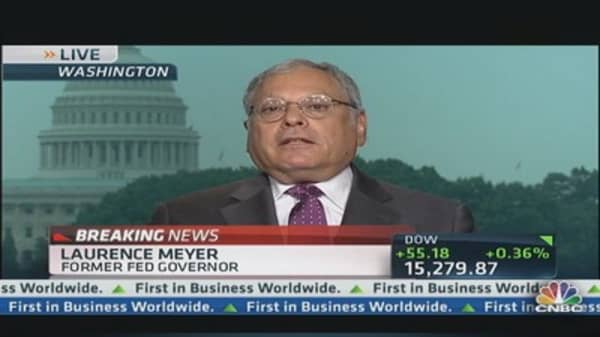Former Federal Reserve Gov. Laurence Meyer told CNBC Tuesday that velocity of money—the rate at which capital is transacted in an economy—shouldn't concern markets, and he dismissed the metric as a guide in setting central bank policy.
The concept is not very useful, Meyer said. "Monetary policy is about affecting rates, which affect financial conditions and affect aggregate demand."
Velocity of money refers to the rate at which money in circulation is spent on goods and services, and economists use it to determine the expected rate of inflation. An economy with a higher velocity of money can expect a higher rate of inflation.
But Meyer, who now works with Macroeconomic Advisors, said that velocity is "just a definition" that doesn't help predict much of anything. "Monetary policy is determined by basically a strategy that is embedded in policy rules. I can't tell you what the money supply is or how fast it's growing—I don't care." he said.
"The word 'money' is never said in our office [and] probably not by the staff at the Fed," he added. "Money doesn't appear in any modern macro model. We have got to get over that, OK? We're beyond that now."
Meyer also said that the Federal Reserve is eager to tighten monetary policy.
"Everything depends on the incoming data," he said. "The [Federal Open Market Committee] clearly believes that the incoming data is going to be strong enough to ... give them the opportunity to taper very soon—and that would be in September," he said.
"The last press conference portrayed an FOMC that is itching to tighten really, because they are much more confident about the second-half rebound, about the underlying momentum, about the economy—or they have become more worried about risks of further easing."
(Read More: Latest Job Gains Are Another Fed Taper Trigger)
In a June interview with CNBC, Meyer said that President Barack Obama "essentially fired" Fed Chairman Ben Bernanke in televised remarks. Obama said that the head of the central bank had "already stayed a lot longer than he wanted or he was supposed to."
— By CNBC's Paul Toscano. Follow him on Twitter and get the latest stories from "Squawk on the Street" @ToscanoPaul



